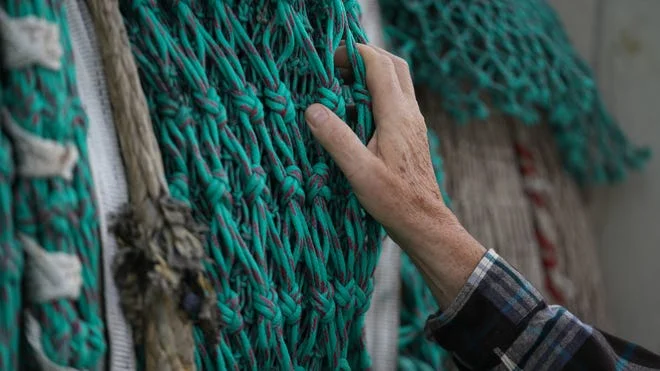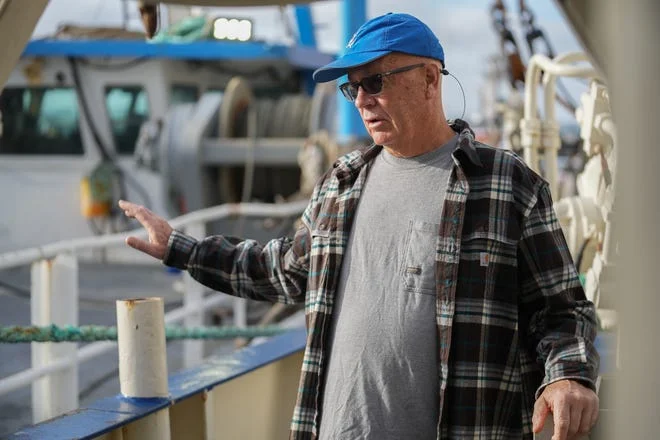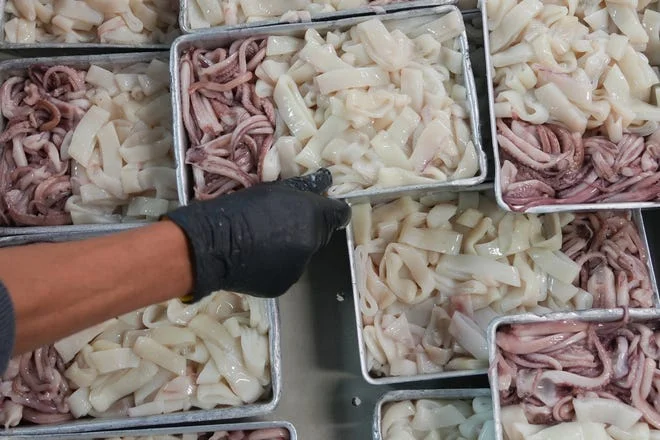Herring fishermen are required to pay the salary of the government observers on their boats. A fight over that requirement could have more sweeping implications beyond seafood.

This week, the Supreme Court will hear a case involving four fishing gang corporations and the federal government that has been fought for years. The justices’ decision in this case might be the most important of the year.
Cape May, New Jersey — The federal government always feels frighteningly close, even out on the broad waters where Bill Bright pilots his 140-foot fishing trawler in pursuit of the Atlantic herring that school beneath the surface.
Before taking flight, Bright and the other captains notify the regulators. Throughout the day, a reporting system pings the location of the boat. Occasionally, Bright is required by law to include a federal observer, whose duties include gathering information about the catch and making sure the regulations are observed.
Bright is fine with those rules. However, he and his fellow fishermen are steadfastly against a 2020 government rule that would have increased their expenses by $700 per day by requiring them to pay the wages of the observers they bring aboard.
On Wednesday, the Supreme Court will hear arguments in a lengthy legal dispute involving four family-run fishing businesses and the Department of Commerce on that regulation. One of the most important cases of the current term, its resolution might spillover into other businesses, dramatically limiting the power of federal agencies to regulate the environment, employment conditions, food safety and other areas of American life.
The conservative legal movement has spent decades working to reduce agency power. Its supporters argue that the government has too much authority and can enact regulations with little or no participation from Congress.
The conservative legal movement has spent decades working to reduce agency power. Its supporters argue that the government has too much authority and can enact regulations with little or no participation from Congress.
Not found (404)

“I recognize that this is a significant political matter,” said Bright, a 40-year veteran of the seafood sector. However, I don’t think this is politics. This concerns morality. It all comes down to what’s best for our fishery.
Putting the blame on Biden
The question of how much respect courts should accord government agencies when they approve restrictions that aren’t expressly allowed by law lies at the heart of the herring observers argument. Courts have deferred to agencies as long as their interpretation of the law is deemed to be “reasonable” following a landmark Supreme Court ruling in 1984.
The question of how much respect courts should accord government agencies when they approve restrictions that aren’t expressly allowed by law lies at the heart of the herring observers argument. Courts have deferred to agencies as long as their interpretation of the law is deemed to be “reasonable” following a landmark Supreme Court ruling in 1984.
A 1976 legislation pertaining to the National Marine Fisheries Service was construed by lower courts as authorizing the imposition of costs on corporations for government observers. The agency was given the authority by that statute to enforce rules that are “necessary and appropriate” for the management of species. The purpose of these rules and legislation is to stop overfishing.
The statute, according to Bright and his associates, makes no mention of paying the fishing sector for the observers. They want the Supreme Court to stop giving courts in that situation as much deference, or at least to curtail it. Fisheries is not the only industry that would be impacted if the justices decide to follow this path.
The Biden administration mentioned in its briefing that the program was discontinued by the government last year. If respect to agencies is reversed, a “convulsive shock to the legal system” is predicted.

A political award for conservatives
A political award for conservatives
However, conservatives have subsequently contended that the ruling gave the courts, who are tasked with interpreting the Constitution, too little power and too much discretion to agencies.
However, conservatives have subsequently contended that the ruling gave the courts, who are tasked with interpreting the Constitution, too little power and too much discretion to agencies.
“They started to complain that this wasn’t helping them. David Doniger, the lawyer for the Natural Resources Defense Council who lost the 1984 court fight, stated, “This is hurting us.”
Alternatively, the Supreme Court can rule that courts must take more time to decide whether a statute is plain in the first place rather than invalidating the 1984 ruling. However, Doniger pointed out that if the judicial rule agencies are not given any respect, judges might impose their own personal policy preferences on laws pertaining to financial controls, food and medicine safety, air and water pollution, and other regulations.

“And you’re going to have chaotic legal interpretations of the same or similar issues if you get conservative judges in Texas going one way and liberal judges in California going another way,” the speaker continued.On Wednesday, the Supreme Court will consider two cases pertaining to fishermen: Relentless v. Department of Commerce and Loper Bright Enterprises v. Raimondo.
gaining success at the Supreme Court?
“My grandfather got up every morning and he went fishing with no net sizes, no mesh sizes, no quotas, no restrictions − he just went fishing,” said Wayne Reichle, president of Lund’s Fisheries and the owner of two the boats implicated in the case.
“My grandfather got up every morning and he went fishing with no net sizes, no mesh sizes, no quotas, no restrictions − he just went fishing,” said Wayne Reichle, president of Lund’s Fisheries and the owner of two the boats implicated in the case.
Reichle claimed that all of that has changed in the modern era of regulation, which the business has learned to adapt to.
The notion that we are overfishing or that we wish to overfish is therefore completely untrue, he declared. “The importance of having healthy fish stocks and oceans for us cannot be overstated.”
However, Bright added, he must also weigh the bottom line with every trip. Every day, he spends thousands of dollars on petrol. Upkeep is necessary for the boats, nets, and equipment. Additionally, he occasionally goes days without earning a penny while at sea. There’s never a guarantee with fishing.
Bright frequently seems to be thinking just about the problems the sector is facing, which include the weather, costs, and regulations.
Bright frequently seems to be thinking just about the problems the sector is facing, which include the weather, costs, and regulations.
So, too, is the potential for success.
